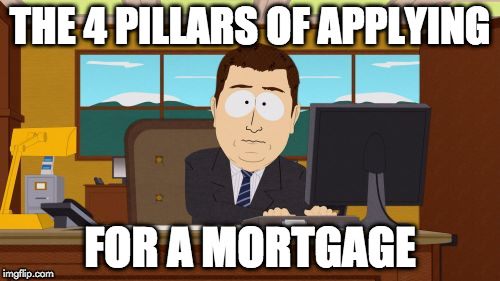A lot of people that are looking to either get into the housing market or move from an existing home don’t know the important factors that play into how much mortgage you will be approved for. I’m going to break down what I am calling the 4 Pillars of Applying for a Mortgage
Lets put yourself on the other side of the table: from the bankers perspective. From Mrs. Banker’s perspective she is looking to extend credit (i.e. a mortgage) to clients while managing her risk on behalf of the bank. She wants to make sure that if she gives someone a mortgage she is going to have a pretty good chance that you can pay her that money back (plus interest).
The four areas that Mrs. Banker will be looking at in order to analyze your risk level are: employment, down payment, credit history, and property.
Employment (aka Income)
In order to service your debt load the bank wants to see how much money you are taking home in the form of verifiable income. That is why they (or your mortgage broker) will be asking for you to collect your Notice of Assessment (NOA’s) and T4’s or other proof that you are gainfully employed.
Down Payment
How much skin do you have in the game? Banks want to know that you have some money to put down against the property. The higher the down payment (%) the lower their risk on the property. For properties that are under $500,000 you can get away with as little as 5% down (in most cases) otherwise you’ll have to come up with a higher minimum amount. To avoid paying the mortgage insurance premium (often referred to as CMHC insurance) you’ll need to put down at least 20% of a down payment.
Credit History
Your credit score will give Mrs. Banker a good idea of how well you were able to pay down your liabilities on time in the past. By looking at your history of servicing existing debt they will have a generally good idea as to how well you’ll be able to make those mortgage payments on time. Your entire history is ranked on a credit score rating, called a beacon score. Scores range from 300-900 pts, although most applicants fall within the 550-780 range. To get the best rates and to pump up that application you’ll want to have a score that is at least 680, although we can get mortgages approved even if your score is in the 500’s. It just means that you don’t have as much bargaining power with the banks. The worse you are in paying your debts down on time (credit cards, car loans, etc) the lower your beacon score will be. So keep up on those payments!
Property
The last piece that people often overlook when looking at obtaining a mortgage is the property. Remember, the bank is loaning you money and using the property as collateral in the event that you do not make good on your promise to pay them back on time. So it makes sense that they would have a vested interested in the type of property that they are putting up the money for. Keep in mind that if you are looking to get pre-approved before going out to shop for a property then you won’t be able to provide Mrs. Banker this information. Typically this is the last pillar that banks will look at but a very vital one in the overall process. Sometimes if the property is strong it can help you in obtaining or stretching that mortgage as banks can be flexible (to a certain degree) but if the property is in lousy condition and they feel that it could be too risky you may not be approved for a mortgage.
To stay on top of the Toronto Real Estate Market and Learn Financing Tips Subscribe to my Newsletter

